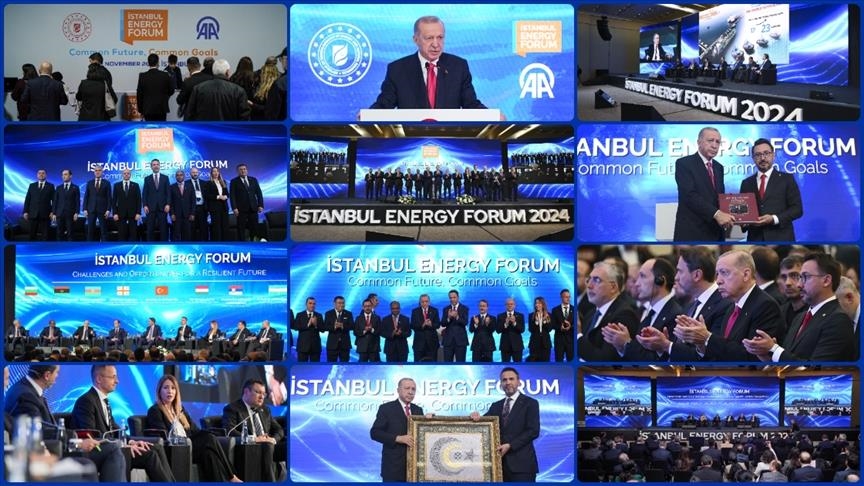ISTANBUL
The global natural gas market is undergoing a significant transformation, Gergely Molnar, an analyst at the International Energy Agency (IEA), said Friday, highlighting Türkiye’s growing role “as a key player, whether as a transit hub or a trading hub.”
The Istanbul Energy Forum, organized by Anadolu under the auspices of the Ministry of Energy and Natural Resources, gathered energy leaders from around the world to tackle shared challenges under the theme, “Common Future, Common Goals.”
Among the highlights of the event was the panel on “Prospects for New Technologies and Fuels in a Smart Energy Transition,” moderated by Elif Dusmez Tek, president of the Energy Digitalization Association.
Global gas market shifts as LNG becomes key supply
Molnar emphasized the transformative role of liquefied natural gas (LNG) in Europe’s energy mix, noting it has become the continent’s new base load supply amid soaring gas prices and shifting global energy flows.
Although natural gas prices have eased from 2022 peaks, Molnar said they remain high, with European spot prices at $15/MMBtu (metric million British thermal units), triple the 2020 average.
“The market remains volatile due to tight fundamentals and geopolitical uncertainties,” said Molnar.
Global gas demand, in the meantime, rose 2.8% in early 2024, with all-time highs expected in 2024-2025 as China and India lead demand growth, he said.
He said, however, that LNG supply growth lags at 2% for 2024, though it may accelerate to 6% in 2025.
Molnar highlighted Turkey’s growing role as a gas hub, citing investments in LNG import infrastructure and the Sakarya gas field, which is expected to supply 15 billion cubic meters (BCM) per year by 2028.
“Turkey is well-positioned to become a key player, whether as a transit hub or a trading hub. The answer lies in the policy direction and regulatory framework adopted by Turkish authorities,” he said.
Türkiye wants to enhance energy security, clean energy while ensuring sustainability
Bora Sekip Guray, director of the Istanbul International Center for Energy and Climate (IICEC) at Sabanci University, outlined Türkiye’s energy goals — enhancing energy security, advancing clean energy and ensuring sustainability.
“Sustainability includes clean energy, water use, the circular economy, and critical minerals,” he said, emphasizing the need for balance among those objectives. Guray stressed that collaboration across sectors is vital to delivering secure, affordable and sustainable energy.
He noted Türkiye’s efforts in cutting reliance on imports by boosting domestic oil, gas and renewables, aligning with its climate goals of peaking emissions by 2038 and achieving net zero by 2052.
Guray highlighted the push for clean electrification, with electricity’s share in energy demand expected to hit 50% in 25 – 30 years, driven by renewables and nuclear power.
Balancing energy security and a transition to a greener energy system
Kamil Cagatay Bayindir, chairman of the Energy Storage Systems Association in Türkiye, stressed the importance of reducing energy import dependency while boosting renewable adoption and ensuring reliable power for the country’s growing needs.
“Our goal is to provide secure, reliable, affordable, clean and sustainable energy to all,” Bayindir said.
Türkiye currently imports about two-thirds of its energy needs, mainly fossil fuels. Bayindir noted the aim is to reduce the dependency by half in the next decade through increased domestic production and renewable energy expansion.
He emphasized the need to address energy intensity, noting progress with a 4% reduction in 2023.
Bayindir also highlighted the importance of electrification, predicting that electricity’s share in the final energy demand could reach 50% in the next 25 to 30 years, supported by renewables and new technologies like electric mobility and heat pumps.
He called for investments in batteries, power grids and hydrogen to ensure stability, particularly for sectors that are hard to electrify.
He also stressed the importance of energy efficiency and digital tools in optimizing energy systems.
‘There is no such thing as energy transition’
Sohbet Karbuz, director of hydrocarbons and energy security at the Mediterranean Observatory for Energy (OME), emphasized the need to carefully consider the future of gas and to invest significantly in this area.
Highlighting that natural gas is a rich fuel playing a crucial role in the energy transition, Karbuz pointed to “energy addition or energy transformation” rather than “energy transition”.
“Natural gas is not a transition fuel. It is a destination fuel. It will not go away. It is here to stay with us for a long time,” he said.
Goal to install 125 gigawatts of power by 2035
Alkim Bag Gullu, director of the SHURA Energy Transition Center, pointed out the rising demand for energy and the increasing share of renewables within the energy mix, emphasizing the ambitious goals in this area.
Highlighting that the goal is to establish 120 gigawatts of power capacity by 2035, Gullu said, “Türkiye has a target of 7.5 gigawatts by 2035, but we have allocated a far larger capacity than that. So, as of today, approximately 35 gigawatts of battery energy storage capacity has been allocated to be integrated to wind and solar parts.”

